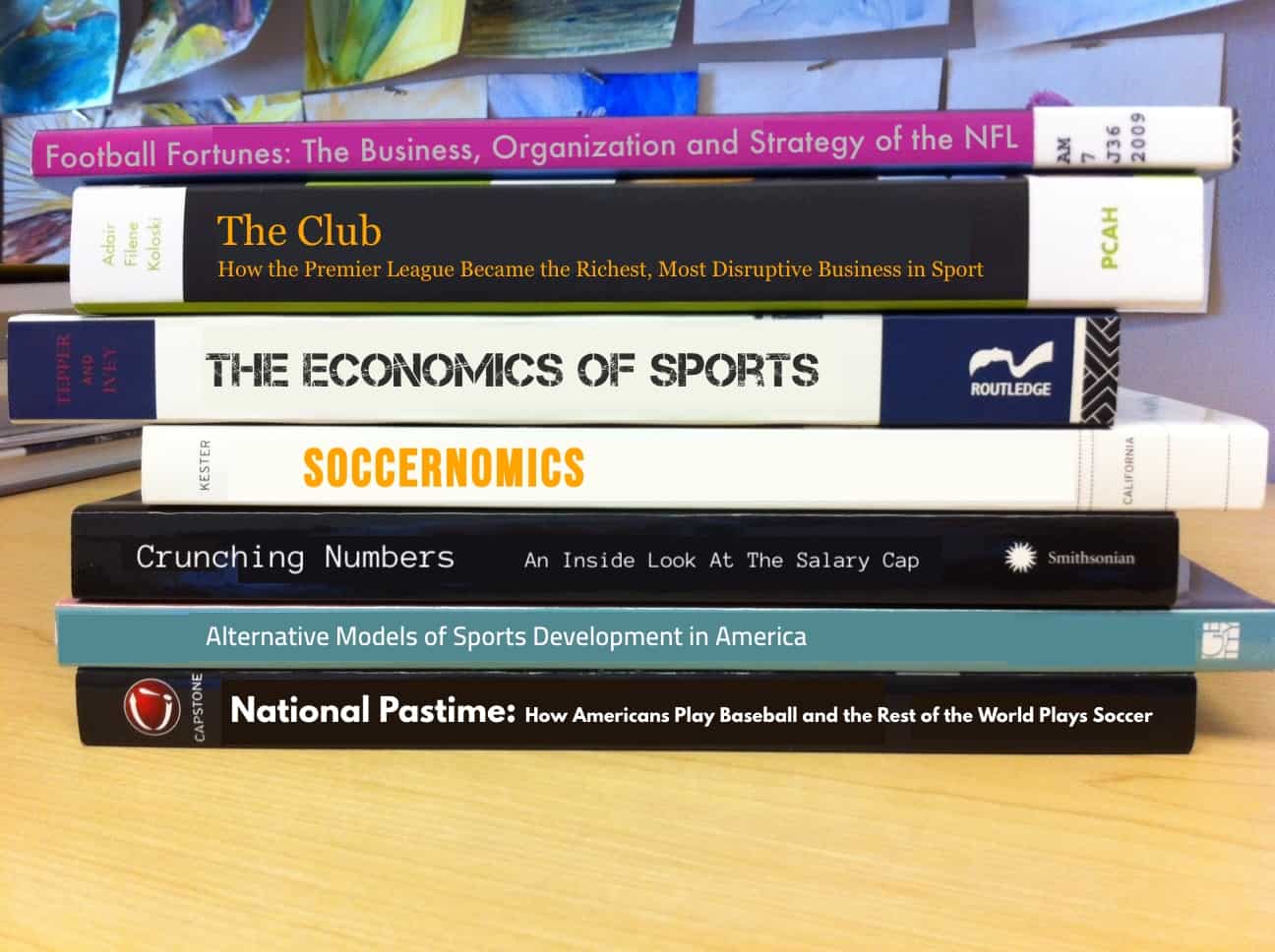
The dismissal of the European Super League symbolized the rejection of the Americanization of European soccer. Essentially, closed leagues are not desirable in the European landscape. Promotion and relegation and the possibility of intercontinental competition makes European soccer special.
However, European soccer has a crisis of competitiveness. Realistically, if only a fraction of clubs win the league over a 20-year period, how competitive is it? This stifling of theoretical possibility stifles the sport from reaching the highest potential of compelling storylines.
An open system can be married with features that help make American professional sports leagues more competitive than any of the top European soccer leagues. In theory, that could help European leagues rival the success of the NFL, NBA, NHL and MLB.
A hybrid between American sports and European soccer
A hybrid model that combines open systems and a pro-competitive feature from American sports is desirable. Now, the vast majority of soccer fans of the European game can only dream of their preferred club winning prestigious honors. That is, unless, they play the likes of the FIFA or Football Manager games.
Cognitive dissonance permeates on both sides of the Atlantic. U.S. professional sports is overly commercialized. Leagues, teams and fans smack of outward arrogance. Yet, Major League Baseball employs a looser model of restrictions than other U.S. professional sports. This applies to marketing, salary structure and even free agency. MLB possesses a far greater share of titles amongst member clubs than in top European leagues.
Thirteen different teams won the Commissioner’s Trophy over the last 20 seasons. That number is unimaginable in leagues such as the Premier League, Bundesliga, Serie A, LaLiga and Ligue Un.
Remarkably, professional baseball does not employ a salary cap like other American leagues. However, as we will explore, MLB has other mechanisms that ensure competitiveness and the health of all its clubs. One such mechanism – a luxury tax – is a great idea for professional soccer.

Leicester City’s improbably EPL crown signaled the first title not won by a “top six” team in 21 years.
In the same period that baseball has enjoyed 13 different champions, the Premier League has had six different champions, the Bundesliga five, LaLiga four and Serie A just three in the same period.
The lack of winners becomes more pronounced when one adds into the equation the total number of clubs that have competed in the four leagues over the 20 years – 49 different teams in the Premier League alone, for example.
Salary caps in soccer
LaLiga implemented the salary cap ineffectively in their first attempt. The cap, established in 2014, differed for teams. It was insurmountable for the clubs already thriving, preventing any positive results.
However, recent developments are a major step forward for the Spanish league. COVID-19 reduced the cap, impacting teams like Barcelona and Real Madrid that already felt the impacts of financial loss.
READ MORE: Barcelona’s $1.5 billion debt: How a mega club fell into a financial black hole.
Consequently, this created more parity in the league. Undoubtedly, the implementation of the cap hurts certain teams more, especially Barcelona. Still, the concept will leave Spanish soccer in a healthier state when it runs its course.
Javier Tebas, the president of LaLiga, talked about how difficult finances can be on all teams, not just those at the top.
“It’s important we all understand that it will be difficult for new players to be joining the clubs. They are now looking to reduce costs. Some clubs will have to sell players or reduce their salaries. There’s no other choice.”
He’s right, and one added benefit is potentially more competitive league title races. However, salary caps also promote wage suppression in addition to their pro-competitive nature. Therefore, it may not be the best solution to the issue.
Luxury tax in professional sports
American pro sports rub many the wrong way. There are many instances of things that take away from the spirit of sports. For example, the manufactured stadium atmospheres, gaudy VIP suites, and publicly funded stadia. They all differ from European fan experiences.
Nonetheless, the U.S. achieved an incredibly even playing field across their major leagues. Let’s focus again on Major League Baseball.
MLB has revenue sharing without restrictive franchise-driven marketing that is imposed by the NFL, NBA, NHL and MLS. Moreover, MLB has a “Competitive Balance Tax,” commonly known as the luxury tax.
In addition, MLB, like other U.S. sports leagues divides general revenue between its teams. This offsets some of the general and inherent inequity between teams in different market levels.
In most seasons, only a handful of MLB clubs pay the luxury tax. But, it ensures competitive balance. This means if a team spends over a certain rolling amount on salaries, a tax is assessed on that club. That tax goes toward a fund for player benefits. Therefore, this allows other teams to equitably split the luxury tax paid by the team.

Derek Jeter was part of the Yankees team to win four World Series in five years in the late 1990s.
MLB distributes general revenue to all MLB teams. Luxury tax receipts are not distributed in the same way. In soccer, those receipts could be.
Prior to the implementation of the Baseball’s luxury tax in 1997, fears persisted that big-spending teams captured the sport. At the time, the New York Yankees in particular reigned over the competition. In fact, what transpired since 2000 is an incredibly competitive professional sport. Without the typical wage suppression like other American leagues, baseball’s parity thrived.
Applying a luxury tax to European soccer
There are plenty of questions on the practicality and practice of a luxury tax in European soccer. Certain factors, notably transfer wages, do not exist in American sports.
In our sport, the North American Soccer League (NASL) quietly implemented a luxury tax system in 2017. Had the league survived its sanctioning crisis with US Soccer later that year, competitive play could have existed. Controversially, the NASL did not use caps on spending. As fans of the former league know, New York and Miami’s big spending dwarfed the ability of other smaller market clubs to spend.
In time, the NASL may have become remarkably competitive. The league could have accomplished this without the hard cap set up by their MLS counterpart.
With Major League Soccer, clubs regress to the artificial mean instead of taking advantage of clubs investing more. In theory, this could have benefitted the competition among rivals.
A luxury tax, for example in the Premier League, could work to enhance revenue divided by clubs outside the proverbial “top six.” Consequently, there is an increased sense of balance.
The European Super League breakaway effort by those same six clubs could serve as justification for such a move. This ensures the long-term health of England’s top flight. Additionally, the competitiveness of clubs excluded from the Super League would grow.
European soccer pundits consider a lack of promotion and relegation as anti-competitive. English supporters and German clubs spearheaded the near-immediate destruction of the concept. However, the lack of promotion and relegation in US sports does not mean that other, pro-competitive measures can be studied from US leagues and implemented in Europe.
Realistic Expectation
We already see the success of Spain’s salary cap. While hard caps are wage suppression techniques that should be avoided, luxury taxes offer something different. These taxes are efficient and progressive ways of creating increased competition. The Premier League benefits from having multiple clubs that win a title in a given season. Still, those clubs are practically the only clubs that can win a title in any given year.
When American pro sports features are often mentioned in Europe, the assumption is that it involves closed leagues and hard salary structures. However, the luxury tax idea is a softer landing which doesn’t require a closed league structure or wage suppression. Yet, it can make all the difference toward creating a more competitive landscape.
200+ Channels With Sports & News
- Starting price: $33/mo. for fubo Latino Package
- Watch Premier League, World Cup, Euro 2024 & more
Live & On Demand TV Streaming
- Price: $35/mo. for Sling Blue
- Watch Premier League, World Cup & MLS
Many Sports & ESPN Originals
- Price: $9.99/mo. (or get ESPN+, Hulu & Disney+ for $13.99/mo.)
- Features Bundesliga, LaLiga, Championship, & more
2,000+ soccer games per year
- Price: $4.99/mo
- Features Champions League, Serie A, Europa League & NWSL
175 Premier League Games & PL TV
- Starting price: $4.99/mo. for Peacock Premium
- Watch 175 exclusive EPL games per season
110+ channels, live & on-demand
- Price: $59.95/mo. for Plus Package
- Includes FOX, FS1, ESPN, TUDN & more





















RJB
October 14, 2021 at 2:51 pm
I cringed when I saw the phrase “compelling storylines” 🤮
Tony
October 13, 2021 at 12:02 pm
I have never read so mush S—
So the winner of the premier league if something like this happened would be WORLD CHAMPIONS just like the baseball world series winner (World series withe teams from two countries playing !!!)
NaBUru38
October 6, 2021 at 1:37 pm
I certainly agree with the concept of luxury taxes.
For example, PSG could continue spending lots of money on hiring top players, but its rival French clubs would receive a hefty bonus and therefore not get left behind.
dave
October 2, 2021 at 2:58 pm
@Turfit, I tend to agree with your comment “I don’t see how a luxury tax on European soccer will ever work. Each country with their own league and rules . . .”
.
The NFL is the only option for a football player who wants to make big money on a big stage playing against the best competition. This is slightly less the case for NBA, NHL, and MLB, but those leagues are all leaps and bounds ahead of the next best alternative.
.
By contrast, soccer has many leagues and countries that could potentially be the “best place” for players and fans. If country A has wage restraints, investors and top talent might flow to country B, with fans and merchandising and rights deals following. Even if all of Europe were to agree, what would stop China or South America or another non-Europe entity from investing and trying to take over as the next big global soccer destination?
dave
October 2, 2021 at 2:42 pm
@Ra, great question with “I can see it benefitting owners, but what is the benefit for players of this draft model?” Leagues have a fixed number of roster slots and in many cases a fixed aggregate salary. A cynic might note that restraining rookie eligibility and compensation benefits veterans who happen to be the majority of votes in the union (prospects are not union members). I am confident there are less cynical explanations, but that is outside my understanding.
.
Your comment “It just appears to me that players lost their freedom and are negotiated when they are out of the college like cattle” strikes me as more or less correct. In the NFL, for example, a rookie deal (years and total compensation) is predetermined almost exclusively by draft position. The freedom and really big money come at the expiration of the rookie deal. A typical NFL career is 3-5 years, and many NFL players never get a second deal.
Turfit
October 2, 2021 at 2:21 pm
Luxury tax on a 32 team close league makes sense. I don’t see how a luxury tax on European soccer will ever work. Each country with their own league and rules and teams getting promoted and relegated, too many issues.
I don’t think the problem is on the top end of the league. I think the bigger issue that needs to be address is the debt that the second division teams get into when they make a push for the first division and fail. This is especially a problem in England. Just look at Derby County. How do they fix this issue????
Ra
October 2, 2021 at 8:16 am
@dave I am very intrigued by this model. I can see it benefitting owners, but what is the benefit for players of this draft model? If the union negotiated these terms on behalf of the players, it should be beneficial to them in theory. Do you know what their argument is? Are the owners obligated to offer contracts they wouldn’t otherwise do?
–
It just appears to me that players lost their freedom and are negotiated when they are out of the college like cattle. Actually, with cattle you still have multiple offers.
dave
October 2, 2021 at 1:20 am
@Ra, your question “So – does that mean that an NCAA player can skip the draft process altogether and sign with whoever he wants?” is interesting. The short answer is “no”.
.
All major US sports have drafts, and the team holding a player’s rights has exclusivity to sign or trade the drafted player for a specific period of time. A player can decline to sign and become a free agent (or re-enter the draft, it is complicated) once the time period expires.
.
Drafts are generally unlawful in the US for the reasons you postulate. Major sport drafts are legal because all players are represented by a union that collectively bargained the existence of the draft and associated rules (eligibility, salary caps, free agency, and the like). I believe any player or prospect who feels wronged by draft or salary cap rules would sue the union (provided the league acted in accordance with the collectively bargained agreement).
.
Specific to NBA, the NBPA (union) since around 2005 (?) requires players to be 19 years old and 1 year out of high school to be drafted. College is a common place for top prospects to spend their year (“one and done”), but there are options like G league, Europe, private training, and the like. Many stakeholders dislike the current 19/1 rule, which did not exist when LeBron went pro.
.
Specific to the topic Kartik raises, I am curious to understand whether a luxury tax would be legal in Europe. FFP aside, I tend to think of Europe as being more pro-worker and pro-union than the US. If so, my gut instinct is that even an indirect wage restraint such as a luxury tax could be challenging to implement lawfully and consistently across every relevant league and country.
Ra
October 1, 2021 at 4:20 pm
@Turfit. It is not that they are not being paid, it is that they prohibit them from being paid, while coaches and other people benefit millions from them. The problem is that the system is designed to exploit.
Based on the SCOTUS decision, they agree that these are abusive terms, intended to exploit athletes for the benefit of other actors. The multi-millionaire coach (on the video) arguing that those who made him rich should do it for free based on his twisted view on what fairness is is disgusting and infuriating.
And thanks for pointing it out – High School sports is another disgrace.
Turfit
October 1, 2021 at 3:33 pm
@Ra, I disagree with you on your statement that players are being “exploited by College sports”. Why stop at college? Does Texas high school football exploit high school kids? Allen Tx has a 18,000 seat high school stadium that cost $60,000,000 ten years ago to build and it is not the largest high school stadium in Texas. A lot of high school football coaches make more money than the school superintendents. Should we start paying these kids to play football? Apparently 18,000 people can pay to watch them play in Allen…..
And what about division 3 college sports where the kids do not even get a scholarship, are they being exploited?? Last year there was 11 players from D3 schools playing in the NFL.
Ray Seals is an example of a NFL player that did not play college sports. Not sure if there is any active players.
If Buffalo does not build the bills a new stadium, will the team stay in Buffalo? When there is several larger metro areas without a team? Economic 1o1, supply and demand. Should cities subsides these teams? Hell no!!! but they will.
Ra
October 1, 2021 at 3:07 pm
@dave PS: does that happen often or did it happen with LeBron just because he was incredibly talented?
Ra
October 1, 2021 at 3:06 pm
@dave So – does that mean that an NCAA player can skip the draft process altogether and sign with whoever he wants? If not, why?
dave
October 1, 2021 at 2:22 pm
@Ra says “Give me one example of a player that went straight to pro without being exploited by College sports”. LeBron James is arguably the most famous athlete in the US and he went direct from high school to the NBA
.
Skipping the NCAA entirely, or making a mockery of it through “one and done”, is common in basketball. Hockey and baseball both have pathways to the pros that do not involve the NCAA. Football is still mostly an NCAA to NFL via draft pipeline.
.
If NCAA exploitation and antitrust is an interest of yours, the Alston Supreme Court decision gives a good sense of how that may evolve. Gorsuch wrote for a unanimous court holding that NCAA restrictions on non-cash compensation to student athletes violate the law. Kavanaugh went further in concurrence noting a likelihood that the entire NCAA “student athlete” scheme is illegal. The PDF is available at SCOTUSblog or the US Supreme Court website
Ra
October 1, 2021 at 1:54 pm
@Turfit. I would summarize your points as – “In the current system, the winner takes all”. Very few people make almost all of the money, which would be ok if they were not getting taxpayer money.
It is the same old fallacy that more subsidies (taxpayer money or lower taxes) at the top will trickle down the system. Nothing could be more wrong.
The draft system is an absurdity as well. They protect only the owners from bidding against each other to maintain lower investments and expenses. Give me one example of a player that went straight to pro without being exploited by College sports.
–
John Oliver is spot on. I highly recommend these videos. He is spot on about the absurdity of it all. It is not a coincidence that he gets the Emmy every year.
Turfit
October 1, 2021 at 12:32 pm
@Ra, I have no issues with the NCAA not paying players. Players get paid in scholarships and education. If players are good enough, they can skip college and go straight to the pros and get paid. Instead of complaining that NCAA not paying players, maybe we should be asking why NFL does not have any minor league teams, why are colleges used as a minor league system?
Taxpayer funded stadiums comes with closed leagues with limited teams. Cities fight for the FEW teams (NFL, NBA, MLB) and are willing to pay for their stadiums. If we had at least 100 NFL teams, then these teams will build there own stadiums.
Ra
October 1, 2021 at 12:06 pm
Nobody is going hungry or wasting tax-payer money on the issues outlined above.
There are other issues that bother me more and are in need of an urgent fix:
www rollingstone com/culture/culture-news/watch-john-oliver-blast-ncaa-for-not-paying-student-athletes-201976/
www washingtonpost com/news/the-fix/wp/2015/07/13/jon-oliver-gives-locker-room-pep-talk-against-taxpayer-funded-stadiums/
Turfit
October 1, 2021 at 11:39 am
England: population 68 million, Germany: 84 million, France: 65 million, Italy: 60 million, Spain: 47 million. Total of these five countries is around 324 million and total of 100 teams in their top leagues.
USA: population 333 million with only 30 baseball teams in top division.
I will argue that there is not a whole lot of difference between the top 30 teams in these 5 European countries and the MLB baseball teams in the USA.
Salaries:
Man United $304 million (highest salaries in EPL), West Ham $60 million (ranked #26 in Europe on market value on tranfermarkt website), Newcastle $62 million (ranked #43 in Europe)
LA Dodgers $267 million (highest salaries in MLB), Cleveland Indians $48 million (lowest salaries in MLB)
So maybe things are not as bad as they seems………
rkujay
October 1, 2021 at 7:07 am
A country of three hundred thirty million people which cannot field a competitive team on the world stage indicates something is wrong. Solution? The rest of the world needs to adhere to American standards. Thus, as I’ve said on these pages for years…soccer will always be the ‘next big thing’ in America.
Paul A Kelly
October 1, 2021 at 1:06 am
Agree w KK. For the health of the game, but big clubs will never agree to this. And the threat of breaking away…
Lou
October 1, 2021 at 12:55 am
Well this is refreshing. An actual well balanced and unbiased thesis on how European and American professional Sports leagues can potentially benefit from adopting successful best practices from each other. More like this, please.
Ra
September 30, 2021 at 10:25 pm
I would rather address the issue of capital ownership, limiting foreign shares and any individual of owning more than 10% of these entities. Ideally, they would be fan supported as most teams in Germany.
Michael F
September 30, 2021 at 6:31 pm
I am with all the comments provided above except the one that was for Kartik’s idea. I am an American and what makes it special for me to view euro football is how different the model is from the American sports.
–
I will admit there are some pros and cons to every open and closed league scenario, but to me watching as a fan from across the pond… I am not totally married to one club, and follow many. I can see how difficult it might be for a lifelong Everton or New Castle fan that will realistically will never win a domestic premier league title as long as Manchester City, Manchester United, Liverpool and Chelsea continue to outspend these lesser teams.
–
But here’s the thing. To watch a major shocking upset now and then is what makes the game so special. JP touched on that in his commentary above. Parity takes all of that away. I follow Baseball to a degree and as already mentioned, you still have certain teams dominate the league by being a contender for the World Series every season, despite the luxury tax. And it is a comparison of apples and oranges, based on a playoff system vs a 38 match season for winner take all.
–
I don’t want to see any Americanization of the sport that is in Europe, which made its history, blueprint and nostalgia by having the open system they’ve always had.
–
Don’t ruin that tradition. It’s the most popular sport in the world for a reason. People love to follow annual winners and cheer for wild underdogs. I probably would tune out of euro football all together if they radically changed any of it the way it’s suggested by KK above.
Barry
September 30, 2021 at 6:15 pm
“Prior to the implementation of the Baseball’s luxury tax in 1997, fears persisted that big-spending teams captured the sport. At the time, the New York Yankees in particular reigned over the competition. In fact, what transpired since 2000 is an incredibly competitive professional sport. Without the typical wage suppression like other American leagues, baseball’s parity thrived.”
– In the 20 years before the luxury tax 14 teams won the World Series, one better than the number that has won it in the past 20 years under a luxury tax.
– Where is this typical wage suppression in other American leagues” you speak of? The NBA and NHL collective bargaining agreements guarantee the players 50% of revenue. The NFL guarantee is 48%. While it is more difficult to get exact numbers for MLB, both the commissioner and the head of the player’s union have stated repeatedly that the player’s share of revenue is around 50%.
Barry
September 30, 2021 at 5:53 pm
“Thirteen different teams won the Commissioner’s Trophy over the last 20 seasons. That number is unimaginable in leagues such as the Premier League, Bundesliga, Serie A, LaLiga and Ligue Un. ”
To win the World Series you first have to qualify for the playoffs and then you have to wade through three or four rounds of playoffs. In major European domestic leagues the winner is decided over a 38 or 34 game schedule playing every other team twice. So comparing the World Series to a domestic league in Europe makes little sense. A more apt comparison would be the Champions League, which also requires you to qualify and then go through four rounds of playoffs. Over the past 20 years ten different clubs have won the Champions League. Not that much different than MLB.
Jesus
September 30, 2021 at 2:27 pm
The problem with such analysis and trying to implement an MLB model to football (soccer) leagues is that the MLB teams are in no danger of relegation and so don’t mind sharing revenue with other teams so long as they are profitable in the long run which is almost always guaranteed by the fact that teams remain in the top flight. MLB teams can also move to another city if need be. American sports leagues are a closed system whose decisions only affect a small number of teams.
Yespage
September 30, 2021 at 11:14 am
I’m not certain how we can compare the MLB (forget the ridiculous name drop of the NASL), which is a single league in the US with absolutely no competition across the globe for players, with Football leagues in Europe which are all competing with each other for talent and continental competitions. Creating a tax would need to be done across the board, but there are economic imbalances between the European leagues. Additionally, with these leagues not being static and having promotion and relegation that provides a unique stress that is not applicable to MLB, where teams are allowed to go to Fallow without consequence.
If anything were to be suggested, I’d say a transfer tax over a certain limit over a year to help bring down the inflation and provide a mechanism to spread the tax with teams that can’t afford those ridiculous fees.
Mercator
September 30, 2021 at 10:53 am
Completely agree with KK. Set a severe luxury tax for Transfer spending over £200m over 3 years, £200 annual wages or having over 11 players out on loan. Let the Saudis buy Newcastle and then implement the tax, use the money to bail out the lower level non-PL clubs. It will appear to be a tax on the Saudis but will also put a stop to City and Chelsea running away with everything and keep will Arsenal, United, Liverpool and now Newcastle competitive. Let’s see how good Pep is then.
JP
September 30, 2021 at 9:42 am
Will also add, the obsession with parity is also misguided. Look at college football, dominated by Alabama, Clemson, Ohio State most recently with it mostly being Alabama. Still wildly popular.
–
NBA always most interesting when there is that one team everyone loves/hates and trying to knock down. Think the Shaq/Kobe Lakers, Lebron’s Heat, Golden State (especially with Durant).
NFL at it’s best when everyone hating the Patriots of the 2000’s or the Cowboys of the 1990’s. Dynasties are good for sports!
–
Having that villain makes it more compelling. If anyone can win in any given year…when there is no hierarchy to to climb…like the Pistons of the 80’s needing to finally get by Boston then Chicago of the 90’s needing to finally get by Detroit, it makes winning less meaningful.
The journey to the top (or hope for it) is often more enjoyable than being at the top (when it’s expected and anything less is a disappointment). .
Ra
September 30, 2021 at 9:40 am
@JP I am in agreement. The last thing I want is the americanization of European sports. There is already plenty to choose from for those who like it (NFL, NHL, NBA, MLB, MSL). It is great to have different things for different tastes. Why this obsession with turning everything Vanilla?
–
I also don’t get the obsession with the popularization of soccer here. Why and for who? Who would benefit from it? Certainly not me – I can already watch all the soccer I want on the cheap. We can see more games and for much cheaper than in countries where soccer is the national obsession. The status quo suits me very well.
–
I agree with the different objectives. Bundesliga is a very entertaining league even with Bayern winning year in and year out. I enjoy seeing Bayern’s efficiency, but the fight for UCL and Europa and against relegation makes it all very interesting. It is also fun to see who will be able to defeat the mighty Golias.
JP
September 30, 2021 at 9:19 am
Using MLB, which is slowly dying, not the best example if you want to promote this as a model for European soccer to emulate!
–
Luxury taxes and revenue sharing do make it more competitive, in theory. However, it also allows badly run organizations to turn a profit while putting out a miserable product.
–
Yes MLB has had more variety of winners, but mixed in all that, one of more of the big market teams like LA, NY, Boston are always there. So while you can have a Kansas City who hits lightning in the bottle with their young players maturing at the same time and being good enough to win, these are usually short lived. The big markets still always thrive unless going through a self imposed “reset” to get under the luxury tax for a season or two.
–
No No No No to any Americanization of European soccer. Winning the title isn’t the ONLY goal for clubs each year, and that’s what makes it great. This focus on “only this many different winners” is misguided. Outside of Leicester the EPL has had the same rotation of clubs win recently in City, Liverpool, and Chelsea. Still the most popular in the world. Some of those years it wasn’t even close, so can’t use the “it’s competitive to the very end” argument.
–
Teams that don’t win the title still fighting for UCL spots, EL spots, or just to stay in the top flight. They can also focus on Cup competitions, etc. This makes the season interesting, even if the winner is clear by February in some cases. It also forces smaller clubs to be smart and choose players wisely if they want to compete. Can’t just coast on the windfall of taxes from larger clubs to maintain their profits.